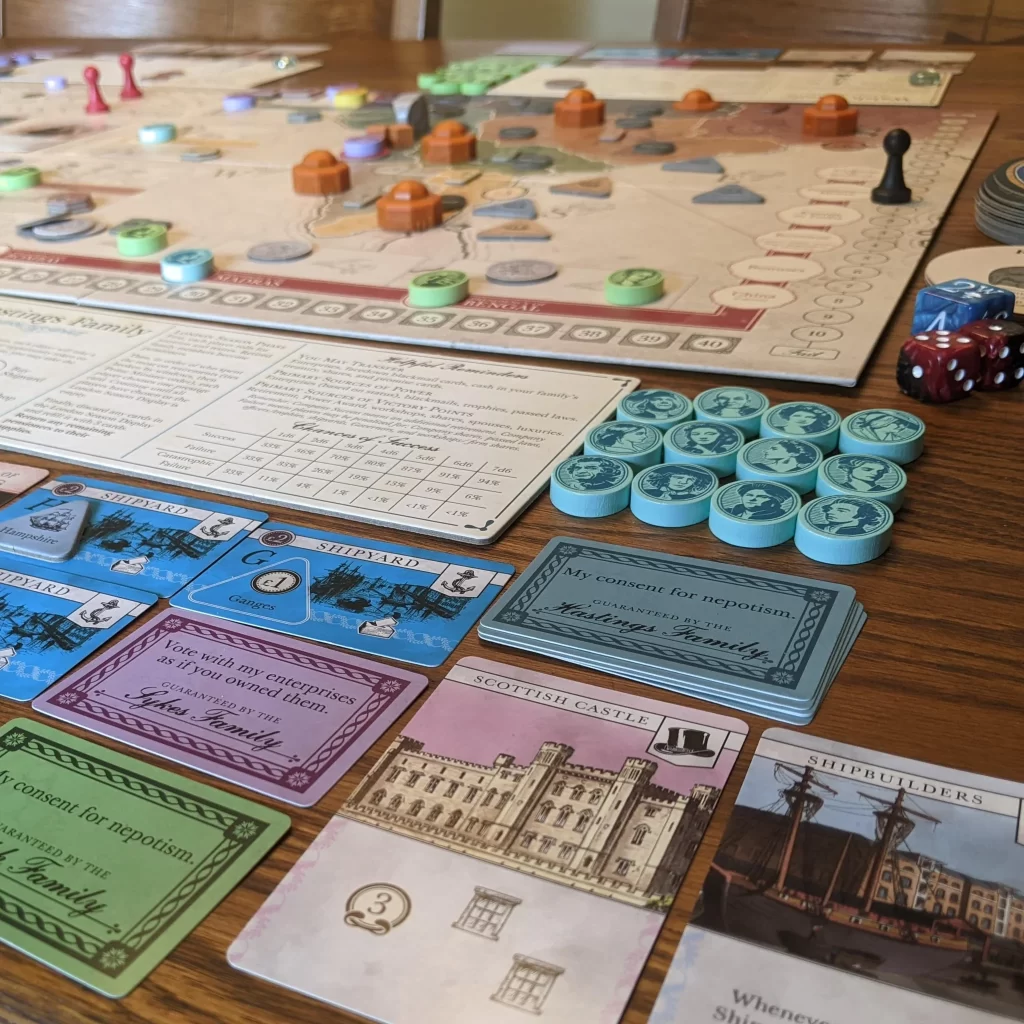Anyone who actually listens to my opinions and decides to try a new game based on my reviews (hi, mom!) deserves to know what an unusual 10/10 star rating represents. The quickest explanation is it’s probably going to be a Cole Wehrle game. If you’ve read my reviews, you know how I feel about them. John Company has a quality that puts it a level above his other stellar games. The mechanics are completely addictive. So if the cares of this world have grown far too painful and you’re thinking about becoming a junkie or a workaholic or something, I’d suggest you take a less drastic step and consider trying out John Company first. This is what’s known in my business as a “harm reduction” approach. Like addiction, hardcore John Company playing will suck up your time, alter your character, transform your life, and cause all your friends to hate you. You’ll become completely obnoxious and will find yourself thinking and doing things you never thought you would, now that this single force dominates your life. But in the final analysis, the toll that John Company will take on your personal relationships is considerably less than those associated with heroin addiction or being a workaholic. So if you’re casting around, please, give this a shot. If JC doesn’t do it, that other stuff will always be there for you to fall back on.

The reason I’m comparing this to a heroin addiction is that one can’t just casually play this game. It’s a real commitment. It’s not an activity, it’s a lifestyle. Wehrle is the haute couture of board games, and it gratifies me enormously that, while the tragic course of my life has doomed me to unglamorous clumping around in H&M drudgery, nothing prevents me from hobnobbing in salons with John Company families while contemplating the money I can earn thanks to abusive colonialism. And frankly, I have quite an anemic understanding of colonialism so I won’t be focusing on that here. I will, however, gush unashamedly on Cole’s designs. I’m sorry if this makes you uncomfortable Cole, but you have the kind of brain I want to make a candlelit dinner and write poems to.

Trying to describe the complex rules of this game is probably too tall an order considering my fragile, weak brain. So I won’t. But the beauty of this is, you don’t have to endure me rewriting the rulebook. You just get my hot takes. And hot take number one is this: I definitely can’t recommend this game to everyone across the board. I’m very aware there’s a number of game elements people won’t like, particularly if you want to run and hide when you hear the word “negotiation”. Literally everything in the game except family members can be negotiated. I’m not so good at clever negotiation, something my 2 year old knows quite well and uses every time she successfully talks me into another “choochie” (that’s cookie, for the uninitiated). So why do I love this game if I suck at its core mechanic? Maybe it’s because it’s so totally unlike any other board game I’ve known and loved. You’re forced to evaluate the value on every single thing. JC has you constantly considering your position relative to others. I can’t think of another game that does that this well. This game has me completely wrapped around its little finger, despite its deleterious effects on my personal life.
The other potential downside for folks is the dice rolling. And when I say dice rolling, I mean it. You’re rolling dice for a large portion of the actions. The spectre of randomness most assuredly lurks within, but it’s not mindless. There are all sorts of ways to mitigate the dice rolling and it really adds an almost comically absurd undertone to the game’s subject. As the rulebook says, “Doing business in India is risky.” The number of dice you roll depends on the resources you want to spend, giving you a better chance of success but weakening your position later. When you roll for a success check, 3 or 4 are failures and 5 and 6 are catastrophic failures in which you immediately lose your position in the company and any hope of a pension. Apparently you were so disastrously idiotic that the rest of the company would prefer the office remain vacant for a while rather than you hold it.

But the thing about this game is, you don’t need to be a ruthless negotiator or dominating personality to do well. To some degree, you can make your decisions and then you’re just along for the ride, perched above the board watching it all play out. There’s an opacity, which can make it hard to predict outcomes, but it doesn’t matter because you’re just in it for personal gain. You can work hard to make the company successful OR you can burn it to the ground if it suits you. It’s not too difficult to do. Pivot whenever you want. Many times, you just coincidentally find yourself in positions of power where everyone needs something from you and you can be a little asshole and say

I don’t want to overstate the randomness here though. There is true strategy to John Company, but when you’re new and learning, you can still enjoy the game just as much. The game has a brilliant tension between cooperation and competition, mirroring the Company’s greed and self-interest while overshadowing established social order. Ultimately, yes, in the end someone wins and the others lose. But more than that, it’s about how much you can screw over the company while still maintaining an air of dignity. By the time you’re finished, you’ll either feel like a Machiavellian genius or need a long shower to wash off the moral grime.
I cannot overstate how much I love this game. It is currently tied for my favorite along with Arcs and I don’t know if it can be beat. All I really want to do these days is play John Company, talk about John Company, think about John Company etc….One of the glorious tragedies of this game is that it almost destroys my capacity to play anything else. Maybe that’s my cue to bring this review to an end. Once I finish, I can look at my board game collection, bleary-eyed, but ready for something new in an effort to move on with my life…
NAHHH! Anyone up for a game?